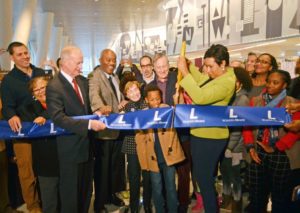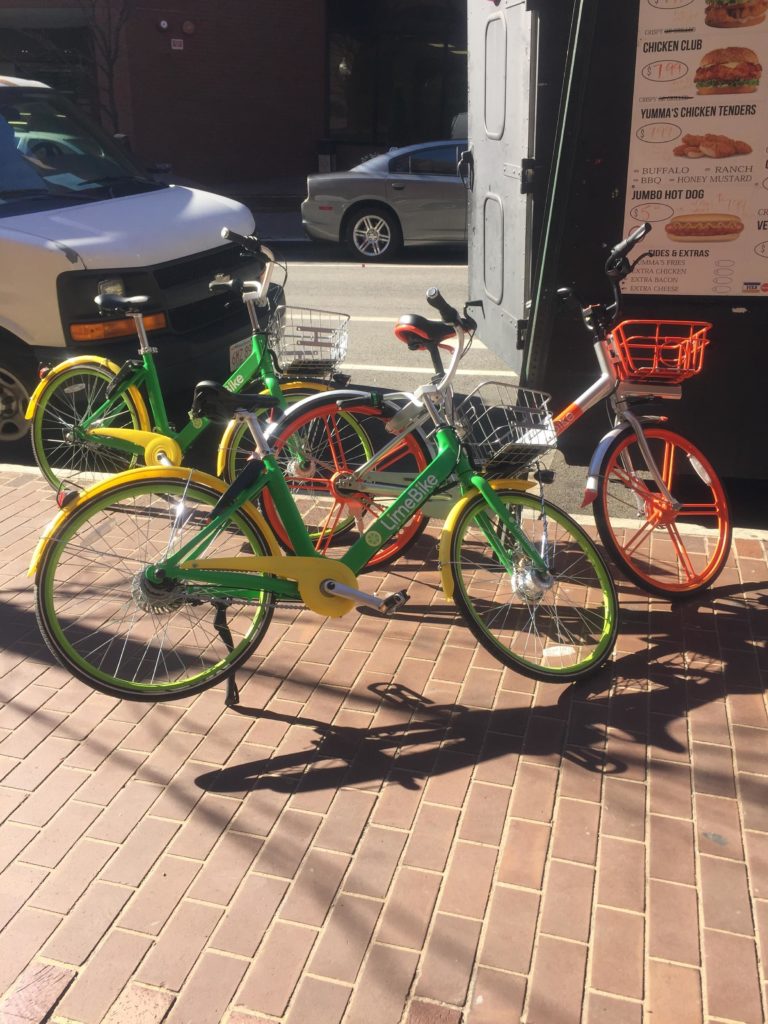By Peggy Sands and Robert Devaney
Dockless Shared Bikes Surge in Georgetown
Bike enthusiasts, concerned citizens and advisory neighborhood commissioners from Foggy Bottom and Georgetown packed the meeting room of Francis-Stevens School on N Street NW on Dec. 5 to discuss the newest transportation mode in Georgetown: dockless shared bikes.
The bikes come in all colors: lime green, yellow, blue, neon red and rust orange. They are not to be confused with those provided by the city’s Capital Bikeshare program — solid orange bikes that need to be picked up and returned to docking stations.
A dream come true for commuters who want a bicycle immediately and close to (if not in front of) their homes or workplaces, the inexpensive dockless bikes can be left right at a rider’s destination. Everything is paid for, located, unlocked and locked via smartphone apps that are free for users to download. Riders have none of the worries or responsibilities of ownership, such as registration, insurance, maintenance and disposal. You just find the nearest bike, ride it and leave it.
Since June, five companies have set up dockless shared bicycle businesses in D.C.: Lime Bike, Mobike, Ofo, Spin and Jump, which also offers semi-electric-powered bikes. The operating technology, utilizing GPS and electronic payment systems, was developed in China. The procedures are printed on each bike. Prices start at $1 an hour.
All the programs have preliminary operating agreements with the District Department of Transportation. During the pilot period through February, no company is allowed to expand beyond 400 bicycles in the District, although all have plans and capacity for hundreds, if not thousands, more.
That’s why none of the company managers seemed to view the competition with
alarm. “We are all here to find the best way to operate in the area. We can all share up to a point to make this whole thing work,” said DDOT’s Sam Zimbabwe at the packed town meeting. Right now, all are serving a growing demand.
But there are issues of concern. During the meeting, residents told stories of bikes parked in front of driveways, entry gates and parking spaces. The GPS systems on the bikes can pinpoint where the bike is, but cannot indicate if it has fallen down on its side or is blocking a passageway. Spokespersons for several of the companies responded that all the bikes have phone numbers on them; if called, they will deal with problem bikes as soon as possible.
Another issue is quality. “I picked up one bike, moved it from my entrance and it fell apart,” said a woman from Dupont Circle. “It’s all right. I know how to fix bikes, so I fixed it. But it’s certainly a cheap bike.” Some of the companies are prioritizing an inexpensive ride over durability, apparently.
Stashing is another concern. The GPS systems can usually determine if a client is hiding a bike to have it handy for the next use.
To date, all the companies use credit-card-based payment systems. What about people who don’t have them? Some companies are looking at stores (7-Elevens? Starbucks?) or agencies that could process cash transactions.
The young dockless bike operations clearly are works in progress, eager for feedback and on-the-ground information, seeking to establish best practices. There are lots of proponents and some opponents. Expect to see increasing numbers of the colorful bikes around Georgetown.

Mayor Muriel Bowser cuts the ribbon at the West End Library Dec. 9. Photo by Patrick G. Ryan.
Glass-Encased West End Library Opens
A light snowfall — the first of the winter — didn’t dampen the enthusiastic presence of hundreds of West End residents and D.C. dignitaries on Saturday, Dec. 9, when Mayor Muriel Bowser and District of Columbia Public Library Executive Director Richard Reyes- Gavilan cut the symbolic ribbon to open the District’s latest and most contemporary public library, the West End Library at 2301 L St. NW.
Designed by D.C.-based CORE Architecture + Design, the library is encased in a two-story- high, ceramic-fritted glass façade along L Street as part of the Westlight building, which was designed by TEN Arquitectos. The massive open space inside is slashed by white structural concrete columns, marking the various reading rooms, the teen area and the children’s section. A Bluestone Lane café will open next month near the entrance; readers will be allowed to bring closed beverage containers into the library itself.
The 21,000-square-foot library contains seating areas for some 200 people with about 40 public-access computers, plus conference and study rooms. The mural by Adrienne Gaither that runs along the entire back wall is a natural-toned abstract collage of letters spelling out the names of people who are part of the neighborhood’s history, such as Duke Ellington, Petey Greene and Colbert King.
There will also be an effort to minimize undue use of the facility by the city’s growing homeless population, said Council member Jack Evans. “We’re working on screening and other processes.”
A stand familiar to airline passengers stood next to the door, with a frame into which a small roll-on bag would fit. “One bag allowed per customer — this size or smaller,” read the sign above it. Two other instructions read: “one personal bag allowed per customer (purse, backpack or laptop bag)” and “any activity that interferes with customer or staff use of the library is prohibited.” There were also a couple of (apparently friendly) security guards.
The West End Public Library is the first library in D.C. to be entirely planned, funded and constructed as a public-private partnership, at virtually no cost to taxpayers, according to Deputy Mayor for Planning and Economic Development Brian Kenner. The public entity is the District government, which permitted the land to the EastBanc development company. EastBanc built the library at its own expense within the Westlight luxury and affordable housing condominium complex, still under construction.
Georgetown University Rejects Grad-Student Union
On Dec. 7, Georgetown University administrators rejected a proposal to
support unionization and collective bargaining for graduate students who teach undergraduates and do research at the university. The grad students who teach now work under short-term contingent contracts with few if any benefits.
A majority of the faculty (estimated between 51 and 61 percent) at the university — an arguably elite private institution with yearly tuition exceeding $50,000 — are not full-time tenured professors. Paid by the class, which may or may not be continued, they have little if any leverage to improve their conditions — ranging from “bad to deplorable,” according to “Campus Confidential,” a 2017 book by Jacques Berlinerblau, a professor at Georgetown’s Walsh School of Foreign Service.
However, the university’s Executive Committee of Graduate Studies, the principal policymaking body for graduate programs, passed a resolution affirming the committee’s position that graduate students who teach — estimated to be at least a third of the contingent faculty on campus — are enrolled in degree programs as students and should be treated as such, not as employees.
Other prestigious universities such as Yale University, Boston College and Columbia University have opposed unionization for graduate instructors. They have posted on their websites that “Unionization could alter the graduate student instructors’ relationships with their own professors and limit their individual rights.”
Graduate students who sign teaching contracts point out that they are the instructors of record for a majority of the classes offered to undergraduates. They teach under the same expectations and responsibilities as tenured professors would if they were the instructors of record. “Collective bargaining is the only way universities will take their demands for better working conditions seriously,” they wrote in a petition to Georgetown University President John J. DeGioia on Oct. 27.
Now the Georgetown grad-student instructors are preparing to file for collective bargaining rights with the National Labor Relations Board without the university’s support. In 2016, the NLRB determined that graduate assistants on private campuses are employees, not students, and therefore entitled to collective bargaining.
But some activists worry that with the change of administrations after Donald Trump won the presidential election, the NLRB could reverse that decision. Meanwhile, the Georgetown Alliance of Graduate Employees is urging the university to reconsider their request under its “Just Employment Policy.”

Cleared lot in front of Hyde School on O Street. Photo by Robert Devaney.
Construction Update: Hyde-Addison School
The construction site for the renovation of Hyde-Addison Elementary School on P Street is down to bare ground. It looks pretty clear at this point. According to the DC Public Schools website, plans for the winter include continued site clearing, demolition grading, excavation, shoring and underpinning. Concrete work, including footings and foundations, will be followed by the erection of structural steel. By spring of 2018, the steelwork will be completed and façade work will commence.
Some interesting artifacts have been found, cleaned and collected during the excavation period, including animal bones, clay and glass bottles and a complete millstone.
Construction Update: Former Latham Hotel Site
The building that housed the Latham Hotel and Michel Richard’s Citronelle restaurant has been gutted to a shell and the structure at 3000 M St. NW once occupied by La Madeleine café completely demolished. That structural demolition, the first phase of the site’s redevelopment, is scheduled to continue through the first quarter of 2018, according to Josh Greenwald, spokesperson for New York-based Thor Equities. Renderings of the new hotel, restaurant and retail space show a broad glass and brick frontage along this prime commercial stretch of M Street.
GBA Salutes Police, Appalachian Spring, Etc.
The Georgetown Business Association gathered Dec. 13 at Malmaison restaurant on K Street for its holiday reception — along with its annual awards and elections.
David and Paula Brooks of Appalachian Spring, which closed its Wisconsin Avenue store after 48 years in Georgetown, were given a lifetime achievement award. Two public safety awards were given to the Metropolitan Police Department: one to officer David Mosley, who could not attend (the award was accepted by Second District Commander Melvin Gresham); another to Police Chief Peter Newsham. Citing his desk job and not being at risk as much as the other men and women of MPD, Newsham said he accepted the award on behalf of all of them.
Outgoing GBA President Sonya Bernhardt, publisher of The Georgetowner, was given a first-ever special community service award by the organization. She thanked all for working to help end the Georgetown liquor license moratorium. Bernhardt welcomed the new executive director of Georgetown Main Street, Jesse Himmelrich, and thanked GBA Vice President Hope Solomon for all her hard work to make the new program a reality. She also thanked Theresa Nelson of Long & Foster Real Estate and Zubair Popal, owner of Malmaison.
The GBA officers for 2018 are Hope Solomon, president; Constantine Ferssizidis, vice president; Alan Helfer, treasurer; and Paul Monarch, secretary.


